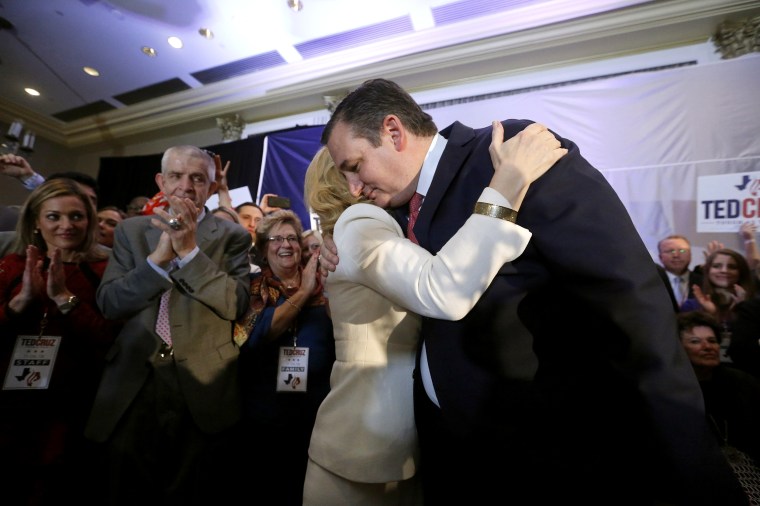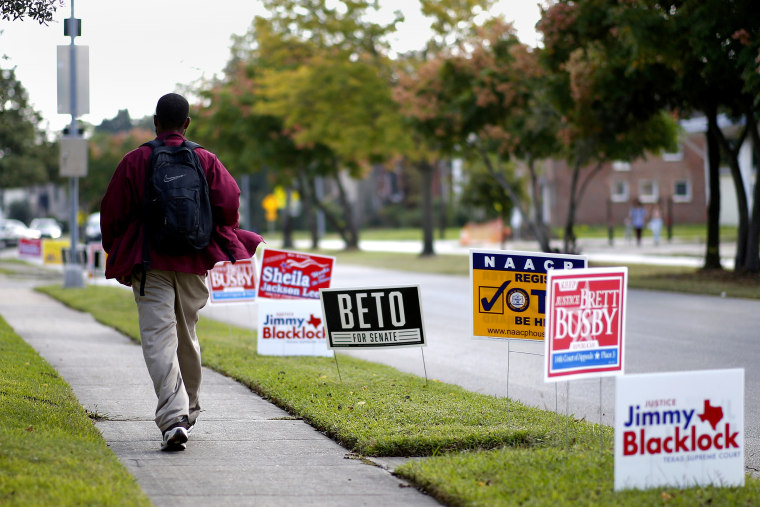Keep Texas red? Republicans may have a new law for that.
Age- and race-related demographic changes, as well as a statewide blue-wave fueled by opposition to President Donald Trump, threaten to put numerous state and federal races in play for Democrats after decades of Republican wins.
But under a rule that went into effect this month, the threshold for third parties to get on the ballot in Texas was lowered in a way that watchdog groups, nonpartisan experts and progressive activists all say is designed to siphon votes from Democratic candidates and boost the prospects of the GOP in contests where the margin of victory in 2020 is expected to be razor-thin.
“This is part of a very clear strategy by the Texas GOP to keep the demographic changes we’re seeing in Texas from being reflected at the ballot box,” said Anthony Gutierrez, the executive director of the Texas branch of the government watchdog group Common Cause. “This is one of the ways they could use a third-party candidacy to knock off a percentage point or two from a Democrat, allowing Republicans to retain power for a bit longer than maybe they otherwise would have.”
Texas House Bill 2504, passed along party lines by the state’s Republican-controlled Legislature in May and signed into law by Republican Gov. Greg Abbott in June, lowers the threshold that minor political parties — defined in the law as parties that nominate by convention, as opposed to by primary — must meet to have their candidates appear on the ballot.
Under the new law, a third party’s candidates can qualify to appear on the ballot if any one of them got 2 percent of the vote in a statewide race in the last five elections. Previously, a third party’s candidates earned a spot on the ballot if any one of them won 5 percent of the vote in any of the most recent statewide elections.
The law also requires minor parties to pay a filing fee to ensure their candidate actually appears on the ballot — or collect the required amount of signatures under existing Texas ballot access laws within a certain amount of time. (For 2020, under state statute, the number of signatures would be more than 83,000, the equivalent of 1 percent of the total votes cast in the last governor's race). Previously, filing fees had only been required for the two major political parties.
Republican supporters of HB 2504 say it bolsters the electoral system by both making it easier for smaller parties to have access to the ballot and by evening the playing field for such access.
But a far greater number of critics — including political scientists, Democratic Party and progressive strategists, as well as the two most prominent third parties in Texas — say the bill is designed to pull votes from Democratic candidates by making it easier for Green Party candidates, who are more likely to attract disaffected Democratic voters, to appear on the ballot.
The result could prove to make a defining difference in a handful of closely watched races in an increasingly purple Texas, including its U.S. Senate race where Sen. John Cornyn is up for re-election, a number of state House races and possibly even the presidential race — although Green Party presidential candidate Jill Stein won 0.8 percent of the vote in 2016 and only 0.3 percent in 2012.
“When you hear about Republicans trying to get Green Party candidates on the ballot, it really makes you wonder what’s going on. Because, obviously, they’re not aligned — today’s GOP is not engaged at all with issues dear to the Green Party,” said Paul Brace, a political science professor at Rice University, in Houston, who specializes in state politics. “And the reality is that allowing the Greens on the ballot helps Republicans, and so there’s good reason to be cynical about this.”
Brace, and several other experts, pointed to recent returns to make their point.
Green Party candidates had for years qualified, under the prior ballot access rules, to appear on the ballot in Texas. But in 2018 — for the first time since the 2008 elections in the state — the party failed to qualify, owing to the fact that no Green Party candidates running in statewide races in 2016 had cleared the 5 percent threshold. Without any candidates on the ballot in 2018, none would have been allowed to appear in 2020, either.
But by enacting HB 2504, Republicans have thrown the Green Party a lifeline, leading experts to conclude that their timing was squarely intended to help the Greens — and themselves.
“It would be one hell of a coincidence if that weren’t the case,” said James Henson, the director of the Texas Politics Project at the University of Texas at Austin.
At the same time, 2018 saw the closest U.S Senate race in Texas in 40 years, with the Democratic nominee, former Rep. Beto O’Rourke, losing to the incumbent Republican, Ted Cruz, by only 2.6 percentage points. Also in 2018, Democrats picked up two seats in the U.S. House, two seats in the Texas state Senate, and a whopping 12 seats in the Texas state House. Texas Democrats need to win only nine more seats in the state House to gain control — which they haven’t held since 2002 — and party officials told NBC News they are optimistic.
Those trends, fueled by an increasingly young and diverse electorate in the state, have moved Texas squarely into the “battleground state” column. In turn, watchers of Texas politics say they've observed Lone Star State Republicans make moves to secure their decadeslong hold on the state.

“Texas is shaping up to be, possibly, the most competitive it’s been in 20 years. 2018 showed us this. And in any competitive political environment, like this one, every little nuance can make a big difference,” Brace, of Rice University, said.
Republican state Rep. Drew Springer, who sponsored the bill, told NBC News that the measure was designed to “even the playing field” to benefit smaller parties and that “the system, as it was, protected the two-party system too much.”
The criticism around the bill, said Springer, who represents a largely rural northern Texas district, “shows that Democrats just want to limit ballot access.”
Springer and other Texas Republicans, however, appear to be the only fans of the bill.
Glen Maxey, the legislative affairs director for the Texas Democratic Party, said the bill will "absolutely" hurt his party.
"The talk of Texas being a battleground state has really come to the forefront in the public's mind recently, and I think Republicans are just looking for something, anything, that can help them in their races," he said. Maxey also expressed concern that conservative groups and individuals might quietly fund the new filing fees that Green Party candidates will be required to pay.
Texas’s Libertarian Party, which for decades has had no trouble qualifying for the ballot at the higher threshold and will continue qualifying under the new, more relaxed rule, told NBC News it strongly opposes the the law, too — due to the filing fee component.
Even the Green Party of Texas has ripped the bill.
Alfred Molison, the co-chair of the party, told NBC News that “it’s only there by the whim and caprice of the powers that be” and slammed it as a “tool by one major political party, whose only purpose is to hurt the other major political party.” The state’s Green and Libertarian parties even teamed up to sue the state over the bill, alleging that it violates their constitutional rights by creating “severely burdensome requirements” on minor political parties. Libertarians cite the filing fee, while Greens cite the signature requirements.
But unless the suit advances, the law seems destined to remain in effect, likely placing an added onus on Democrats in the state to earn every vote.
“In Texas, in the year 2020, each (major) party will need every vote they can get their hands on,” Henson said. “Anything that could adjust those totals in the slightest could matter.”

